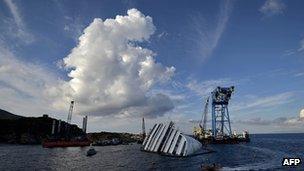Costa Concordia: Ship captain Schettino attends inquiry
- Published
The BBC's Alan Johnston describes how the hearing has brought Captain Schettino face to face with survivors of the sinking
The captain of the Costa Concordia cruise ship, which hit rocks and sank off the Italian coast in January, has made his first appearance at an inquiry into the disaster.
Capt Francesco Schettino was not compelled to attend, but had said he wanted to be able to confront those building the case against him.
Thirty-two people were killed in the disaster.
During the hearing, data from the black box of the ship will be revealed.
The captain is accused of causing a shipwreck, manslaughter and abandoning ship before all passengers were evacuated.
He has defended his actions, saying many more would have died without his interventions, says the BBC's Alan Johnston in Grosseto, where the hearing is being held.
Court-appointed experts have heaped blame on the captain for sailing the huge ship too fast and too close to the shore at night.
'Sail-past salute'
The pre-trial investigation into the sinking of the Costa Concordia cruise ship is entering its final phase.
Capt Schettino and eight others, including three executives from owner Costa Crociere, are under investigation. The court will determine whether they should be put on trial.
For months, experts have been dissecting the smallest details of this disaster, and at last they are ready now to set out their findings, formally, before a judge, our correspondent says.

The Costa Concordia remains in the water off the Tuscan coast
But much of what the experts will tell the judge is already known, as their report has been made public.
Capt Schettino had been trying to carry out a spectacular, night-time, sail-past salute to people on the tiny island of Giglio, the experts say.
In public statements, Capt Schettino has accepted a degree of responsibility.
He apologised, asked for forgiveness and wept during a television interview as he talked of those who died.
He says he managed to steer his stricken vessel close into shore, preventing it from sinking in deep water where hundreds might have drowned.
The experts also say some blame for the way the disaster unfolded must be attached to the cruise ship company's shore-based crisis management team, our correspondent adds.
It should have had a better understanding of what was going on, they say, and it should have given the captain better advice.
Any subsequent trial is not expected to held until the beginning of 2013 at the earliest.
Meanwhile, the shipwreck remains in the water off the Tuscan coast. Salvage crews are working to stabilise and refloat the hulk, which is expected to be removed by spring 2013.